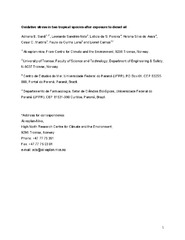Oxidative stress in two tropical species after exposure to diesel oil
Permanent link
https://hdl.handle.net/10037/10812Date
2016-08-03Type
Peer reviewedJournal article
Tidsskriftsartikkel
Author
Sardi Sulvarán, Adriana Eva; Sandrini-Neto, Leonardo; da S. Pereira, Leticia; Silva de Assis, Helena; Martins, Cesar C.; Lana, Paulo Da Cunha; Camus, LionelAbstract
Recent offshore petroleum exploration has increased the risks of oil spills worldwide. We investigated biomarker responses to diesel oil exposure in two tropical and subtropical species, the clam Anomalocardia flexuosa and the polychaete Laeonereis culveri. Animals were exposed to oil-spiked sediment at two different concentrations (0.5 L and 1.0 L m−2). Activities of antioxidant enzymes catalase (CAT), superoxide dismutase (SOD), and glutathione peroxidase (GPx); glutathione transferase (GST); and lipid peroxides (LPO) were assessed in bivalve digestive glands and polychaete whole-body homogenates at 36 and 60 h of exposure. Significant variation in enzymatic antioxidant activity depended on the sampling time after exposure. No similar response patterns, either increases or decreases, were detected for the two target species, and biomarker responses were species-specific. L. culveri showed clearer patterns in its antioxidant response and should be prioritized over other species in biomonitoring studies involving oil exposure. Understanding the temporal variability of these biomarkers is a necessary action before implementing them as indicators measures in oil contamination biomonitoring programs. Our results provide a better understanding of biomarker responses in subtropical species, evidencing their potential use as sentinels of oil contamination.
Description
Link to publishers version: 10.1007/s11356-016-7280-2


 English
English norsk
norsk